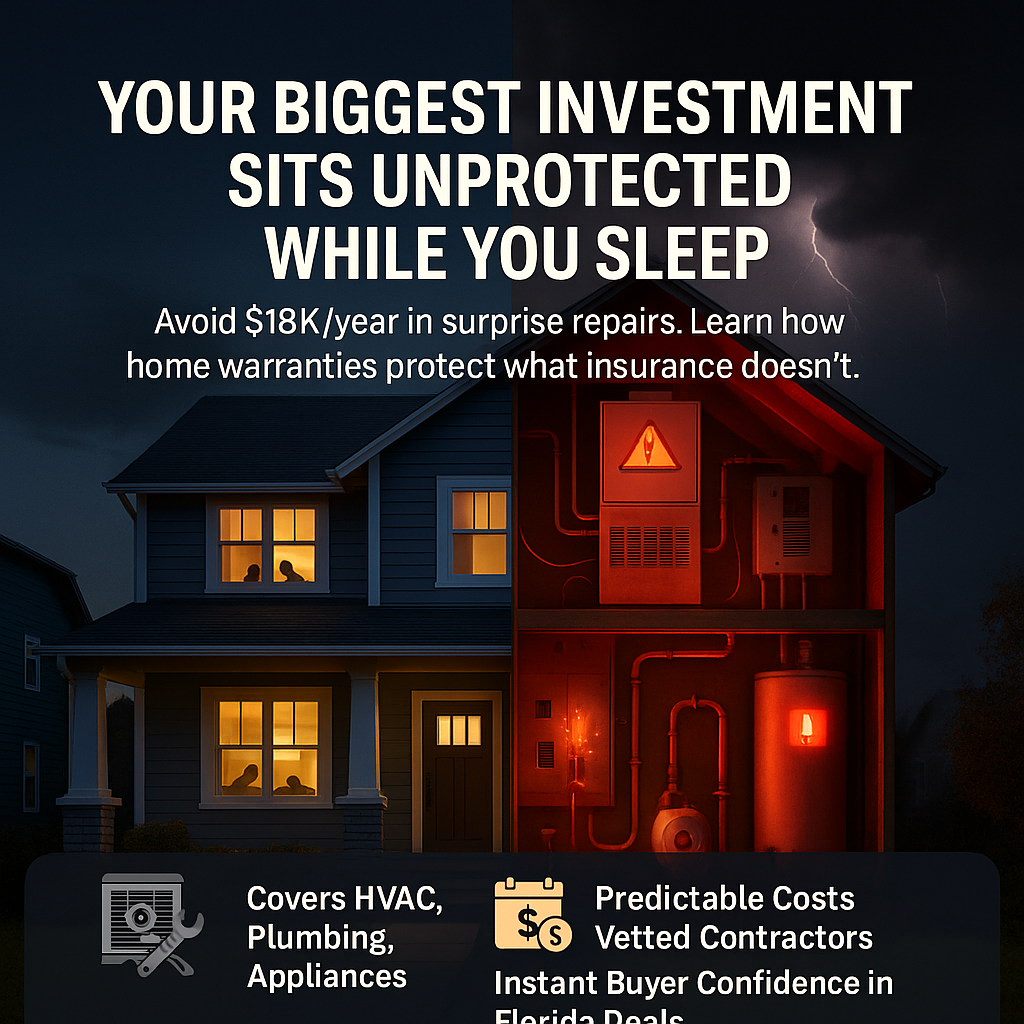
Home Warranty Secrets From Palm Beach Pros
Every year I watch buyers skip warranties then panic six months later.
The air conditioning dies in August. The water heater floods the garage in December. The pool pump gives up during the first family gathering.
Florida's humidity and heat accelerate system breakdowns. What works fine in Virginia might last two years here instead of five.
After decades in real estate and technology, I've learned that home warranties represent one of the most misunderstood tools in property transactions. Most people see them as optional add-ons. Real estate professionals know better.
Ninety-two percent of us recommend warranties to clients. We see the aftermath when buyers decline coverage.
What Warranties Actually Protect
Home warranties cover the expensive stuff that breaks when you least expect it.
Major systems like heating, cooling, plumbing, and electrical components. Kitchen appliances, water heaters, and in Florida, pool equipment. The items that cost thousands to replace and always seem to fail right after you've spent your savings on closing costs.
Statistical data shows one in five homeowners faces a significant system breakdown each year. In Florida, that number feels conservative.
The financial structure makes sense. Annual premiums range from $220 to $1,800 depending on coverage. Service calls typically cost $60 to $100. Compare that to replacing a central air system in Palm Beach County.
I've seen buyers spend $8,000 on HVAC replacement six months after closing. The warranty would have cost them $600.
The Transaction Strategy Most Agents Miss
Smart sellers use warranties as closing tools. Studies show homes with warranties sell faster and often at higher prices.
When I list properties, warranties become part of our Target Marketing approach. They signal confidence in the home's systems and reduce buyer anxiety about hidden problems.
Buyers see warranties as seller investment in their future peace of mind. Sellers see faster closings and fewer repair negotiations.
The psychology works both ways.
Choosing the Right Coverage
Not all warranty companies operate the same way. I evaluate providers based on contractor networks, response times, and claim handling.
Look for companies with established Florida contractor relationships. Response time matters when your AC dies in July. Check Better Business Bureau ratings and read actual customer reviews.
Coverage details matter more than premium costs. Some plans exclude pool equipment or limit coverage on older systems. Read the fine print before signing.
Plan flexibility allows customization based on your home's specific needs. A house with a new roof might skip that coverage but double down on appliance protection.
Timing and Acquisition
Warranties can be purchased before, during, or after closing. Most have 30-day waiting periods, so earlier beats later.
Three acquisition methods work best:
Seller-provided warranties transfer with the property. The seller pays, buyer benefits. Most warranty companies, including reputable providers, make transfers seamless.
Agent-arranged warranties happen during transaction negotiations. We coordinate with preferred providers and handle paperwork integration.
Direct purchase gives buyers maximum control over coverage selection and timing. You choose the provider, plan, and effective date.
I recommend securing maintenance records for covered items. Documentation helps with future claims and shows the warranty company you've maintained systems properly.
The Florida Factor
Florida's environment creates unique warranty considerations. High humidity stresses HVAC systems year-round. Salt air corrodes components faster near the coast. Pool equipment runs constantly.
Standard warranties might not cover everything Florida homeowners need. Enhanced plans often include pool and spa coverage, which becomes essential rather than optional here.
Hurricane season adds another layer. Warranties typically exclude storm damage, but they cover systems that fail from power surges or extended outages.
Service Before Money
Our internal motto guides warranty recommendations. I suggest coverage that serves the client's best interests, not the transaction's profit margins.
Sometimes that means recommending against warranties. New construction with builder warranties might not need additional coverage. Buyers with substantial emergency funds might prefer self-insurance.
But for most Florida homeowners, especially those buying older properties or stretching financially for their purchase, warranties provide valuable protection and peace of mind.
The goal remains the same whether you're buying your first home or tenth investment property. Protect your investment, reduce financial stress, and focus on enjoying homeownership rather than worrying about the next system failure.
Home warranties work best when they're part of a comprehensive homeownership strategy, not an afterthought during closing week.
